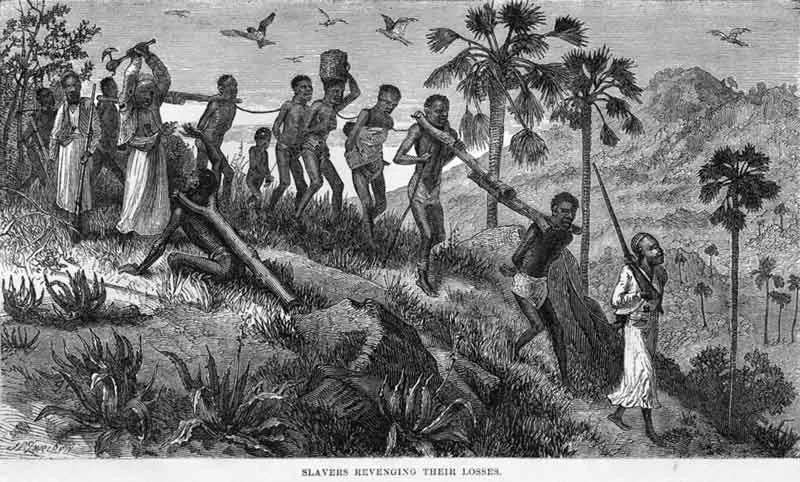CHATTEL SLAVERY 1:
THE ATLANTIC SLAVE TRADE
• READ •
CHATTEL SLAVERY 1:
THE ATLANTIC SLAVE TRADE
What Was the Atlantic Slave Trade?
Slavery means treating people as property and taking away their freedom and rights. It has existed in many parts of the world, but one kind of slavery was especially large and cruel—the Atlantic slave trade.
This trade took place from the late 1400s to the mid-1800s. It connected Africa, Europe, and the Americas, and it forced more than ten million African people across the ocean to work as slaves in the Americas. The effects of this terrible system changed the histories, economies, and families of people all over the world.
How It Began
Europe and Africa had traded with each other for hundreds of years through the Mediterranean Sea. But in the late 1400s, the Portuguese started building colonies along Africa’s west coast. Soon after, the Spanish began to settle in the Americas.
In the new colonies, crops like sugarcane, tobacco, and cotton needed huge amounts of hard labor. There were not enough European settlers or workers to grow these crops. Native American people were forced to work, but many died from new diseases brought by Europeans, and others fought back. So the Europeans began to look to Africa for labor.
Slavery in Africa Before Europeans Arrived
Slavery already existed in Africa, but it was very different from what it would become. Some slaves were indentured servants who worked for a certain number of years and could later gain their freedom.
Others were like serfs in Europe, working on land owned by others. In some African societies, slaves could own property, marry freely, and even rise to important positions.
When European traders arrived offering manufactured goods, guns, and rum in exchange for slaves, some African rulers and merchants agreed to trade. They often sold people who were criminals, debtors, or prisoners of war from rival tribes.
These rulers did not think of the people they sold as “fellow Africans.” Selling slaves made their kingdoms richer and stronger against enemies.
The Trade Grows and Spreads
At first, the trade seemed to benefit African kingdoms that took part in it. But soon, the huge European demand for slaves caused terrible competition. Some kingdoms began to start wars just to capture more slaves. In many places, being sold into slavery replaced other punishments for crime.
As slave raids increased, kingdoms tried to protect themselves by buying European weapons, which they could only get by selling more slaves. This created an endless cycle—an “arms race”—that brought more violence and fear across West Africa.
The Middle Passage
For the people taken as slaves, the journey across the Atlantic Ocean—called the Middle Passage—was one of the most horrible experiences in history.
Captured Africans were marched for miles to the coast, often chained together. At the slave forts, they were shaved to prevent lice and branded with hot irons. Then they were forced onto crowded ships heading to the Americas. About one in five died on the voyage and never reached land.
Ship captains often packed hundreds of people tightly below deck to carry as many as possible. There was little air, light, or food, and diseases spread quickly. Sick people were sometimes thrown overboard. Some captains even cut off a slave’s ear to prove they had purchased them.
Many Africans had never seen white people before and believed they were cannibals who would eat them. Some refused to eat or jumped overboard, choosing death rather than slavery. Those who survived were treated as cargo, not as human beings.
Women and children were kept on deck and often abused by the crew. Men were sometimes forced to “dance” on deck to keep their muscles strong and to prevent rebellion.
Effects on Africa and the World
The people who reached the Americas suffered terrible lives of forced labor. But the slave trade also caused deep and lasting damage to Africa itself.
Tens of millions of Africans—mostly young men—were taken away. This caused a huge loss of population and changed the balance of families and communities. When slavery was finally outlawed in the 1800s, many African kingdoms that had depended on the trade collapsed. Without the slave trade, their economies weakened, and European nations began to colonize Africa.
The trade also brought more war and violence, because so many European guns had been sold to African rulers. These weapons made it easier for European countries to later take control of African lands. The conflicts and divisions created by the slave trade still affect some parts of Africa today.
The Rise of Racist Ideas
Another long-lasting result of the slave trade was the creation of racist beliefs. In Africa, slavery had not been based on race—it was usually a result of war or punishment for crimes. But Europeans, who believed in a religion that taught that all people were equal before God, needed an excuse for enslaving millions of other humans.
To justify their actions, they invented false ideas about race. They claimed that Africans were naturally inferior and meant to be slaves. These beliefs were used to defend slavery and were passed down for generations.
Because of this, slavery in Europe and the Americas became based on skin color. Even after slavery ended, the false idea that Black people were less equal continued to shape laws, attitudes, and social systems.
The Lasting Legacy
The Atlantic slave trade was one of the largest injustices in human history. It destroyed lives, families, and cultures. It changed Africa, Europe, and the Americas in lasting ways.
Its effects can still be seen today—in racial inequality, economic differences, and cultural memory. Understanding what happened during the Atlantic slave trade helps us see how deeply it shaped our modern world—and why remembering it matters.
Abolish – To officially end or stop something, such as a law or practice.
Branding – Burning a mark onto someone’s skin to show ownership or control.
Cargo – Goods or items carried on a ship; in this case, enslaved people were cruelly treated as cargo.
Colonize – To take control of another land and settle there.
Dehumanize – To treat people as if they are not human.
Descendants – Future generations; people who come from a certain group or family.
Economy – The system of trade, money, and jobs that helps a country or region survive.
Indentured servant – A person who works for someone for a set number of years to pay off a debt or earn freedom.
Inferior – Considered lower in quality or importance.
Middle Passage – The long, dangerous sea journey that brought enslaved Africans to the Americas.
Plantation – A large farm where crops like sugar, cotton, or tobacco were grown.
Racism – The false belief that some races are better or worse than others.
Resistance – Efforts to fight against or stand up to something unfair.
Slave trade – The buying and selling of human beings as property.
Unjust – Not fair; wrong.
► COMPREHENSION QUESTIONS
— please answer with complete sentences
1. x
2. x
3. x
4. x
5. x
6. x
7. x
8. x
9. x
10. x










